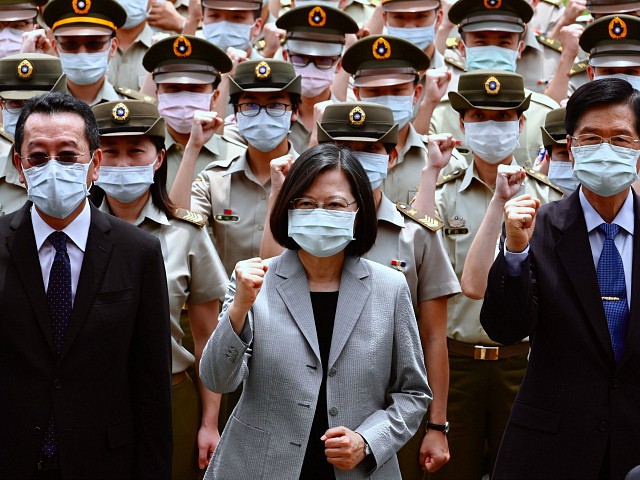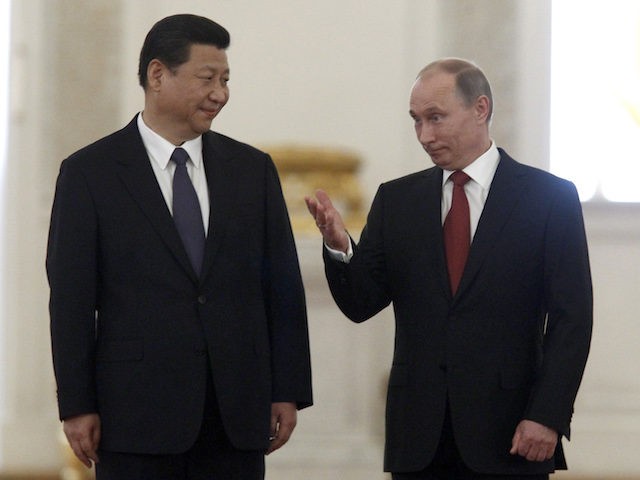Chen Ming-tong, Director-General of Taiwan’s National Security Bureau, told a session of the Taiwanese legislature on Monday that Russia’s poor performance during its invasion of Ukraine could give China second thoughts about attacking Taiwan.
An opposition party legislator asked Chen about a Financial Times interview with American Indo-Pacific commander Adm. John Aquilino on Friday.
Aquilino discussed China’s growing “boldness” in harassing Taiwan with “increased maritime and air operations.”
“I wouldn’t say I’m more concerned, but I do see increased pressure, and we have to make sure we are prepared should any actions get taken,” Chen said.
“I don’t think anyone five months ago would have predicted an invasion of the [sic] Ukraine. So I think the number one lesson is: ‘Hey, this could really happen,’” the U.S. admiral said.
Chen contended that China would study Russia’s difficulties in Ukraine and become less likely to act “rashly” against Taiwan.
“Beijing has never renounced the use of force against Taiwan and it has long been an open plot for it to unify Taiwan ever since 1949,” Chen acknowledged. The Republic of China (ROC) government relocated to Taiwan in 1949 at the conclusion of the Chinese civil war.
“I can tell in the next three years of the remaining tenure of President Tsai, Beijing is unlikely to send forces to attack Taiwan,” he continued. “But we must not relax our vigilance and must be well prepared militarily and once they attack us we must counter-attack. We are not a limp chicken doing nothing.”

Taiwan President Tsai Ing-wen (C) poses for photographs with Secretary General of National Security Council Wellington Koo (L) and Defense Minister Yen Teh-fa (R) while inspecting the the military police headquarters in Taipei on May 26, 2020. (Photo by Sam Yeh / AFP) (Photo by SAM YEH/AFP via Getty Images)
Chen said the Chinese Communist Party was surprised not only by the stiff military resistance Ukraine mounted against the seemingly overwhelming Russian invasion force but also by the scope of Western sanctions deployed against the Russian economy. He said Beijing would become “more cautious in making any move” after studying the impact of “the intervention of foreign forces in the Ukraine war.”
Chen also addressed reports of a leaked Russian intelligence document that supposedly claimed Chinese dictator Xi Jinping could order an invasion of Taiwan this autumn, to boost his political prospects and rally support ahead of the upcoming Chinese Communist Party congress.
Chen dismissed this report as “highly unlikely” and said the “so-called leaked document is part of cognitive warfare targeting Taiwan.”
Chen noted that previous Chinese leaders have resisted suggestions to pass a “reunification law” that would establish a timetable for recapturing Taiwan, and therefore put pressure on themselves to meet it.
After delivering a national security report to a closed-door session of the Taiwanese legislature’s Foreign Affairs and National Defense Committee, Chen told reporters that America’s Taiwan Relations Act (TRA) gives Beijing reason to believe the U.S. and its allies would “be much more involved” in protecting Taiwan from Chinese attack than they have been in protecting the borders of Ukraine.
Chen noted the TRA “grants legal authorization for the U.S. government to take action” if Taiwan is attacked.
“The current situation has given China much to think about, as the U.S. has given much support to Ukraine, even without a law similar to the TRA,” he said. “The conflict in Ukraine has served as a warning to Beijing not to start a war.”
Chen added a note of caution that China could use the war in Ukraine to advance its own geopolitical ambitions and strengthen its alliance with Russia.
“Russia has sought help from China to fight against the economic sanctions, asking Beijing to open up its foreign reserves, and to use the yuan instead of the euro and the U.S. dollar in international exchanges, which conforms to China’s long-term plans to have the yuan replace the U.S. dollar in international transactions,” he said.

COMMENTS
Please let us know if you're having issues with commenting.